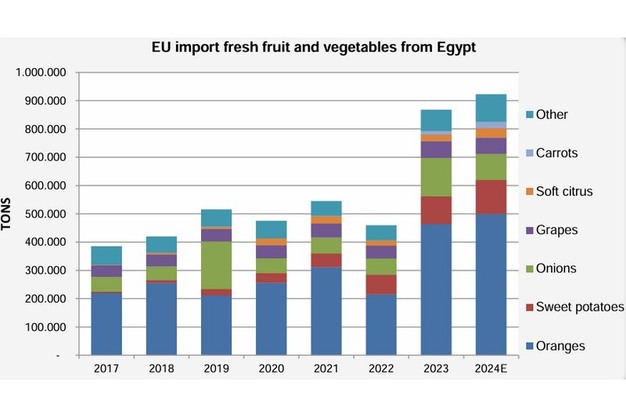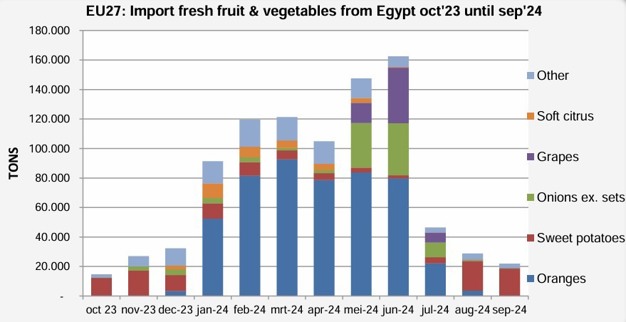Egypt is gaining momentum as an exporter of fresh fruit and vegetables. With an estimated export of 3.5 million tons, Egypt ranks just below the top tier of the largest fresh fruit and vegetable exporting countries. In comparison, the Netherlands and Belgium (re-)exported 9.5 and 2.5 million tons of fresh fruit and vegetables, respectively.
Saudi Arabia and Russia are Egypt's main buyers, followed by the Netherlands, the UK, and the UAE. Fresh fruits and vegetables account for 5.5% of Egypt's total goods exports, valued at USD 2.3 billion out of USD 42 billion. By contrast, for the Netherlands, fresh fruit and vegetables represent 15% of USD 742 billion, and for Belgium, 3.5% of USD 569 billion.
In 2024, EU imports of fresh fruit and vegetables are projected to reach over 920,000 tons, a 7% increase from 870,000 tons in 2023. By comparison, the figure was 475,000 tons in 2000 and only 380,000 tons in 2017.
World's largest exporter of oranges
Oranges are by far the most significant product in Egypt's fresh fruit and vegetable exports. Egypt now exports over 1.5 million tons of oranges annually, making it the world's leading exporter of oranges. Spain and South Africa rank second and third. According to figures from the US Department of Agriculture (USDA), Egypt's orange exports could range from 1.75 to as much as 2.0 million tons.
It is challenging to determine the exact quantities of oranges and other products Egypt exports, as Egyptian export statistics and those of major buyers often lack recent data. Consequently, many figures are estimates.
 Onions as the second leading product
Onions as the second leading product
Onions are Egypt's second-largest export product, with exports estimated at 480,000 tons in 2023. This is followed by sweet potatoes (215,000 tons), grapes (180,000 tons), mandarins (140,000 tons), mangoes (73,000 tons), lemons (58,000 tons), exotics (54,000 tons), and strawberries (43,000 tons).
Sweet potatoes rank second in the EU
In Egyptian exports of fresh fruit and vegetables to the EU, oranges remain the dominant product, with a quantity of 500,000 tons projected in 2024—an 8% increase from 463,000 tons in 2023. In 2022, the figure was 215,000 tons, and in the previous year, it was 310,000 tons.
Sweet potatoes rank second, with EU imports expected to reach 120,000 tons in 2024, a more than 20% increase from 2023. In contrast, EU imports of Egyptian onions dropped significantly to 92,000 tons in 2024, down from 135,000 tons in 2023, which was unusually high at the time.

Noteworthy is the sharp growth in EU imports of Egyptian carrots and lemons. Additionally, the EU imports various other Egyptian fruits and vegetables, including garlic, beans, mangoes, peppers, strawberries, artichokes, lettuce, cauliflower, leeks, watermelons, and peas.
Egyptian oranges dominate Dutch imports from January to June
Egyptian oranges are available from October to July, with the EU primarily importing them between January and June. During this period, they dominate Dutch orange imports. From July to November, South African oranges take the lead.
Egyptian sweet potatoes are present on the EU market from August to December. Egyptian onions are mainly available in May and June, while Egyptian grapes are prominent in June.
Click here for background figures
For more information:
Jan Kees Boon
Fruit and Vegetable Facts
www.fruitandvegetablefacts.com
[email protected]
